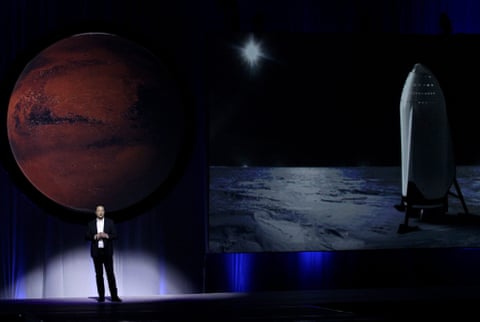The SpaceX boss has envisioned people staying on the red planet in a self-sustaining city in 20 years

Almost buried beneath a recent avalanche of rightwing invective posted by Elon Musk on the platform he owns, X, was one eye-popping statement that made space watchers sit up and take notice: an assertion that humans could land on Mars within four years and be living there in a self-sustaining city in 20.
It seemed a fanciful boast, even by the standards of the SpaceX founder and world’s richest man, who transformed the logistics and cost of shorter-duration, near-to-Earth orbit space travel with his fleet of reusable Falcon rockets. The US government space agency, Nasa, which is collaborating with SpaceX over knowledge and technology to get astronauts to the red planet, believes a first crewed landing by 2040 would be “audacious”.
Neither was it the first time the enigmatic billionaire has floated such a plan. In 2016 he said he believed those first crewed launches to Mars could take place within six years, even though a heavy rocket to fly them was still at the concept stage.
Yet while many might see Musk’s latest proclamation as another example of his braggadocio, following stories he wanted to help populate an extraterrestrial civilization with his own sperm, and have it driving around the Martian surface in Tesla’s troubled Cybertrucks, some analysts see a sense of purpose.
If a Mars settlement of a million people in two decades’ time is an impossible goal, the prospect of regular shuttle flights from Earth aboard SpaceX’s next-generation Starship rockets, carrying cargo and the first human explorers, is absolutely achievable, they say.
“You’re talking about a significant amount of time of development. While it’s not impossible this could be done in time for a launch two years from now, it’s bit of a stretch,” said Robert Zubrin, president of The Mars Society, and author of The New World on Mars: What We Can Create on the Red Planet.
“2028 is fully possible. Now you’re talking about a one-way trip to Mars [but] you don’t want to send people on a one-way trip until there’s greenhouses and settlements and everything, a place to live.
“This is one of the problems I have with Musk’s claim. It is not my sense that they are actually developing the required surface systems for human operations on Mars. They’re working very hard on the transportation system, but on the system to make, say, methane, oxygen on Mars on a large scale, they aren’t doing it.
“Musk seems to be stretched a bit thin right now, and could be stretched even thinner should Donald Trump win the election and he gets appointed commissar of government efficiency, or whatever he’s talking about becoming.”
Zubrin shares Weinzierl’s confidence that SpaceX is likely to ultimately deliver most of Musk’s vision for Mars, just not on the timescale he proposes.
“Starship is going to become operational, I think he’s gotten it far enough to be safe to say that,” he said. “To put things in perspective, Musk frequently exaggerates, both in terms of what he’s going to do and when he’s going to do it, but he nevertheless does, and has done, a great deal, in addition to the concrete accomplishment of drastically cutting the cost of space launch by proving the utility of reusability.”
Weinzierl, meanwhile, says SpaceX has grown as a company to the point that, if Musk were no longer directing operations, it might not matter.
“They just have an incredible ability to attract talent and that speaks to a culture they have very clearly built and maintained which might owe a lot, at least initially, to Elon Musk. There’s no question he is a unique force in the firm, and in society,” he said.
“At this point my sense is that that culture has been embedded in so many people within the firm that it’s not dependent on him as much as we might fear. We wouldn’t want it to be dependent on any one person, and my sense is that it’s not.”





